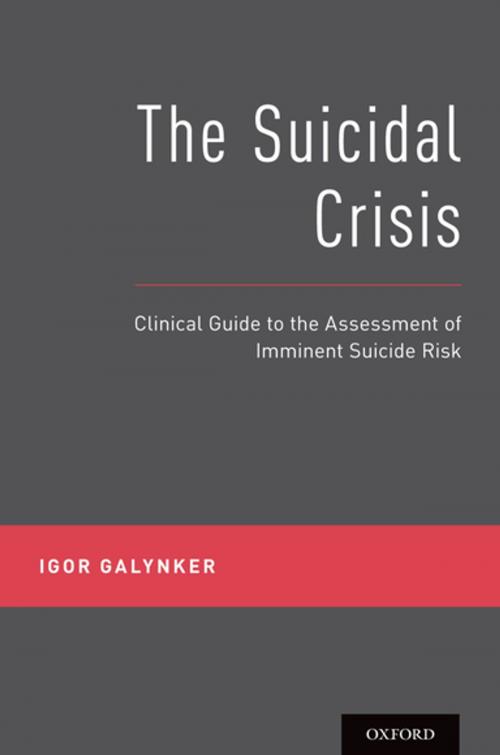The Suicidal Crisis
Clinical Guide to the Assessment of Imminent Suicide Risk
Nonfiction, Health & Well Being, Medical, Specialties, Psychiatry, Ailments & Diseases, Mental Health| Author: | Dr Igor Galynker | ISBN: | 9780190260873 |
| Publisher: | Oxford University Press | Publication: | September 15, 2017 |
| Imprint: | Oxford University Press | Language: | English |
| Author: | Dr Igor Galynker |
| ISBN: | 9780190260873 |
| Publisher: | Oxford University Press |
| Publication: | September 15, 2017 |
| Imprint: | Oxford University Press |
| Language: | English |
Most people who die by suicide see a clinician prior to taking their lives. Therefore, one of the most difficult determinations clinicians must be able to make is whether any given patient is at risk for suicide in the immediate future. The Suicidal Crisis, Clinical Guide to the Assessment of Imminent Suicide Risk, is the first book written specifically to help clinicians evaluate the risk of such imminent suicidal behavior. The Suicidal Crisis is an essential work for every mental health professional and for anyone who would like to have a framework for understanding suicide. Written by master clinician Dr. Igor Galynker, the book presents methods for a systematic and comprehensive assessment of short-term suicide risk and for conducting risk assessment interviews in different settings. Dr. Galynker describes suicide as an attempt of a vulnerable individual to escape an unbearable life situation, which is perceived as both intolerable and inescapable. What sets the Suicidal Crisis apart from the other books of its kind is its sharp focus on those at the highest risk. It presents a wealth of clinical material within the easy-to-understand and intuitive framework of the Narrative-Crisis model of suicidal behavior. The book contains sixty individual case studies of actual suicidal individuals and their interviews, detailed instructions on how to conduct such interviews, and risk assessment test cases with answer keys. A unique feature of the book, not found in any other book on suicide, is a discussion of how clinicians' emotional responses to acutely suicidal individuals may help identify those at highest risk. In this timely, thorough, and well-written monograph, Dr. Galynker provides a method for understanding the suicidal process and of identifying those at the highest risk for taking their lives. Any clinician who works with suicidal individuals-and anybody who knows someone who has considered suicide-will find the book an essential and illuminating read.
Most people who die by suicide see a clinician prior to taking their lives. Therefore, one of the most difficult determinations clinicians must be able to make is whether any given patient is at risk for suicide in the immediate future. The Suicidal Crisis, Clinical Guide to the Assessment of Imminent Suicide Risk, is the first book written specifically to help clinicians evaluate the risk of such imminent suicidal behavior. The Suicidal Crisis is an essential work for every mental health professional and for anyone who would like to have a framework for understanding suicide. Written by master clinician Dr. Igor Galynker, the book presents methods for a systematic and comprehensive assessment of short-term suicide risk and for conducting risk assessment interviews in different settings. Dr. Galynker describes suicide as an attempt of a vulnerable individual to escape an unbearable life situation, which is perceived as both intolerable and inescapable. What sets the Suicidal Crisis apart from the other books of its kind is its sharp focus on those at the highest risk. It presents a wealth of clinical material within the easy-to-understand and intuitive framework of the Narrative-Crisis model of suicidal behavior. The book contains sixty individual case studies of actual suicidal individuals and their interviews, detailed instructions on how to conduct such interviews, and risk assessment test cases with answer keys. A unique feature of the book, not found in any other book on suicide, is a discussion of how clinicians' emotional responses to acutely suicidal individuals may help identify those at highest risk. In this timely, thorough, and well-written monograph, Dr. Galynker provides a method for understanding the suicidal process and of identifying those at the highest risk for taking their lives. Any clinician who works with suicidal individuals-and anybody who knows someone who has considered suicide-will find the book an essential and illuminating read.















